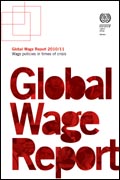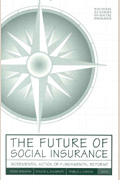Studies in this week’s Hutchins Roundup find that small businesses have a hard time coping with minimum wage increases, digitization contributed minimally to lowering inflation globally and more.
Want to receive the Hutchins Roundup as an email? Sign up here to get it in your inbox every Thursday.
Small businesses have a hard time coping with minimum wage increases
Using credit score data on 15.2 million businesses from 1989 to 2013, Sudheer Chava, Alexander Oettl, and Manpreet Singh of the Georgia Institute of Technology find that increases in the federal minimum wage strain small businesses’ finances. The authors compare businesses in states with minimum wages higher than the federal floor (and thus unaffected by any federal increase) to those affected by increases in the federal minimum. They find that, in states where the federal minimum wage binds, a $1 hike leads businesses to delay payments on loans for one to two days, and makes them 12 percent more likely to default on bank loans and 25 percent more likely to go out of business relative to those in unaffected states. The authors show that the financial strains from minimum wage increases are largest for businesses that are very small, young, labor-intensive, or located in low-income areas, suggesting these firms have the least flexibility in absorbing higher labor costs.
Digitization contributed to lowering inflation globally – but only a little bit
Using IP address allocations per country for 36 countries, Balazs Csonto, Yuxuan Huang, and Camilo Tovar of the International Monetary Fund find that digitalization—the process of converting information to a digital format—lowered annual domestic inflation by approximately 0.05 percentage point on average since 2012. They argue that IP addresses are a better measure of digitalization than the various digitization indices because an IP address is a unique numerical label assigned to each electronic device, thus capturing the available infrastructure in a country and the extent of access to connected devices. They reason that digitalization affects price levels by lowering the costs of production and distribution and improving the flow of information.
IRS letters about the individual mandate tax penalties increases health insurance coverage
In 2017, the IRS sent letters to 3.9 million of the 4.5 million households who paid a tax penalty for lacking health insurance coverage in 2015. The letter reminded households that they had paid a penalty and provided instructions on how to get coverage. Jacob Goldin of Stanford Law School and Ithai Lurie and Janet McCubbin of the U.S. Treasury find that receiving an IRS letter increased the probability that a household had health insurance in the following two years by 3 percent. They also find that this additional health insurance coverage reduced mortality for middle-age adults, leading to one fewer death from 2017 to 2019 per 1,648 individuals who were sent a letter. This is the first experimental evidence that health insurance reduces mortality, the authors say.
 Source: Wall Street Journal
Source: Wall Street Journal
“Not since just after the second world war have we seen a president so openly seek to dictate policy to the Fed. That is a matter of great concern, given that the central bank is one of our key governmental institutions, carefully designed to be free of purely partisan attacks. I trust that the members of the Federal Reserve Board itself, the members of Congress responsible for Fed oversight, and indeed the public at large, will maintain the Fed’s ability to act in the nation’s interest, free of partisan political purposes. Monetary policy is important, but it cannot by itself sustain global leadership. We need open markets and strong allies to support economic growth and the prospects for peace. Those constructive American policies have been a large part of my life. Instead, confidence in the US is under siege.” Paul Volcker, former Chairman of the Federal Reserve









Commentary
Hutchins Roundup: Minimum wage increases, digitization, and more
December 12, 2019